

Adobe. Tom Chatfield – Language and digital identity. Letter To A Young Programmer Considering A Startup. I regularly get emails from young people, usually those with an interest in programming, who are trying to make decisions about school and/or their professional futures.
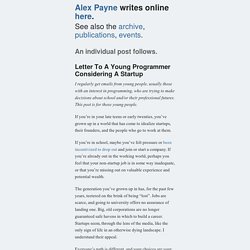
This post is for those young people. If you’re in your late teens or early twenties, you’ve grown up in a world that has come to idealize startups, their founders, and the people who go to work at them. If you’re in school, maybe you’ve felt pressure or been incentivized to drop out and join or start a company. If you’re already out in the working world, perhaps you feel that your non-startup job is in some way inadequate, or that you’re missing out on valuable experience and potential wealth.
Teach Yourself Web Design in 10 Years. Not My Idea I'm a huge fan of giving credit where credit is due.

This post is fully inspired by an amazing post by Peter Norvig that I read at the start of my programming career. It changed the way I thought about development in general and has really been a motivation throughout my career. The Idea Norvig's basic argument is that most books and training resources claim to be able to teach you development in 24 hours, 30 days, or 2 weeks. The conclusion is that either people are in a big rush to learn about computers, or that computers are somehow fabulously easier to learn than anything else. What Does a Web Developer Do? WordPress. WordPress is a free and open source blogging tool and a content management system (CMS) based on PHP and MySQL, which runs on a web hosting service.[4] Features include a plug-in architecture and a template system.
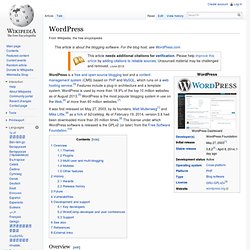
WordPress is used by more than 18.9% of the top 10 million websites as of August 2013[update].[5] WordPress is the most popular blogging system in use on the Web,[6] at more than 60 million websites.[7] Overview[edit] WordPress template hierarchy WordPress has a web template system using a template processor. Themes[edit] Plugins[edit] First Steps With WordPress. WordPress Hosting Review: see the best UK WordPress hosts. With the help of 252 WPShout readers, I’ve put together a comprehensive and independent review of the best UK WordPress hosting.

These are the results. Last March I asked for people to review their hosts so I could find out which hosts were the best for hosting WordPress powered sites. A fantastic 252 people responded and I’ve now put together all of the answers into the promised comprehensive list. There were a lot of hosts which only received one or two reviews and for those I can’t really offer a verdict as two reviews isn’t going to be representative.I’ve used the answers to the questionnaire to provide a simple fact based verdict on 12 hosts, giving them a verdict of Recommended, Consider or Avoid. Free WordPress Hosting: Is It Really Worth It? 45 brilliant WordPress tutorials for designers. Learn WordPress For Free With These 10 Great Resources. Mastering The WordPress Visual Editor. Though WordPress is increasingly on the verge of becoming a fully-fledged application framework, the humble post editor remains the area of the interface users spend most of their time in.

It’s a part of the backend that’s seen significant improvements over the last number of years – the recent move to version 4.0 of TinyMCE in WordPress 3.9 being a highlight – but there’s still plenty of room for improvement. Learn about Java Technology. Java is the foundation for virtually every type of networked application and is the global standard for developing and delivering embedded and mobile applications, games, Web-based content, and enterprise software.
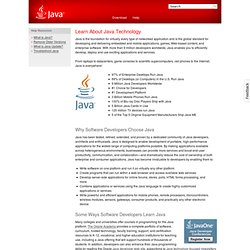
With more than 9 million developers worldwide, Java enables you to efficiently develop, deploy and use exciting applications and services. From laptops to datacenters, game consoles to scientific supercomputers, cell phones to the Internet, Java is everywhere! 97% of Enterprise Desktops Run Java89% of Desktops (or Computers) in the U.S. Run Java9 Million Java Developers Worldwide#1 Choice for Developers#1 Development Platform3 Billion Mobile Phones Run Java100% of Blu-ray Disc Players Ship with Java5 Billion Java Cards in Use125 million TV devices run Java5 of the Top 5 Original Equipment Manufacturers Ship Java ME Why Software Developers Choose Java.
32-bit and 64-bit explained. Will this 32-bit software run on my 64-bit operating system?

Or Will this 64-bit software run on my computer? Web server. Multiple web servers may be used for a high traffic website, here four SunFire X4200 servers are installed together The term web server can refer to either the hardware (the computer) or the software (the computer application) that helps to deliver web content that can be accessed through the Internet.[1] The most common use of web servers is to host websites, but there are other uses such as gaming, data storage, running enterprise applications, handling email, FTP, or other web uses.
Overview[edit] How to Setup local host with Latest Apache, PHP and MySQL Packages. Testing many things (CMSes, themes etc.) on the internet for me and many others is sometimes a big pain and it has many disadvantages. You need to buy a domain, to pay for hosting, to use your internet providers slow upload speeds to upload a files over ftp, whenever you want to change some configuration of Apache or PHP you have to contact your hosting provider and wait some time until they response and I could continue with other disadvantages. Google Chrome OS vs. Ubuntu: Page 2. Printing and Other Peripherals Generally speaking, devices such as headsets, keyboards, mice and external media devices all work fine on both operating systems.
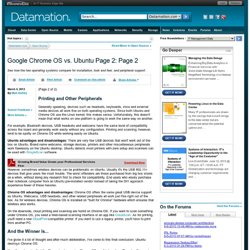
Since both Ubuntu and Chrome OS use the Linux kernel, this makes sense. Hypertext Transfer Protocol. The Hypertext Transfer Protocol (HTTP) is an application protocol for distributed, collaborative, hypermedia information systems.[1] HTTP is the foundation of data communication for the World Wide Web.
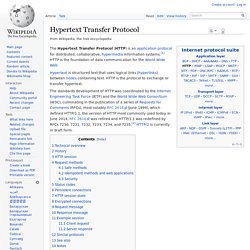
The standards development of HTTP was coordinated by the Internet Engineering Task Force (IETF) and the World Wide Web Consortium (W3C), culminating in the publication of a series of Requests for Comments (RFCs), most notably RFC 2616 (June 1999), which defined HTTP/1.1, the version of HTTP most commonly used today. In June 2014, RFC 2616 was retired and HTTP/1.1 was redefined by RFCs 7230, 7231, 7232, 7233, 7234, and 7235.[2] HTTP/2 is currently in draft form. Technical overview[edit] Introduction to HTML. Static.seomoz.org/files/SEOmoz-The-Beginners-Guide-To-SEO-2012.pdf?inf_contact_key=8c3f31ad4f27e61de480a9559cd630f612072bb7b9ba5776f1517262e2aa49b7.